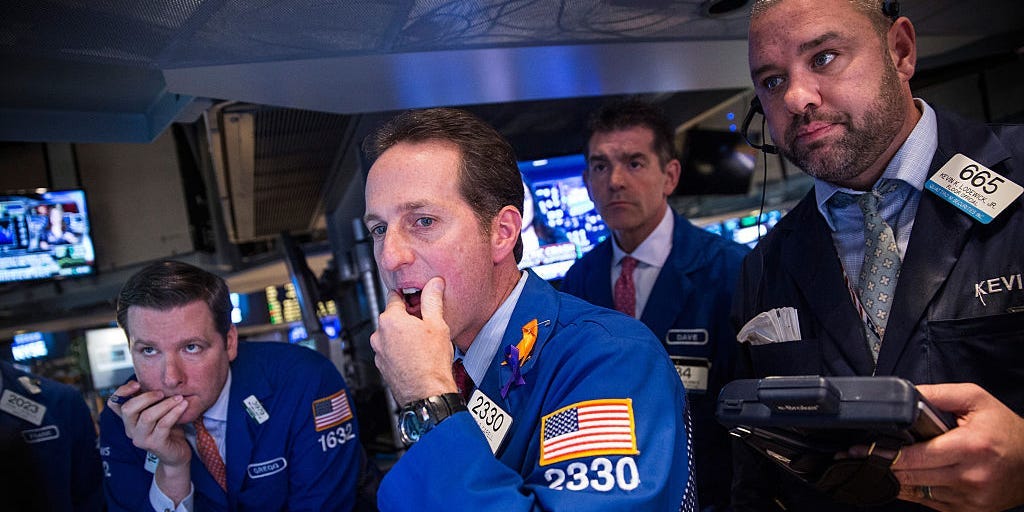Dow futures jumped 450 points Wednesday after the IEA signaled it could release more oil from stocks. Equity markets in Europe rallied alongside US stock futures, with the DAX up more than 5%. Brent crude fell 2% to around $125, losing grip on gains made after the US banned Russian oil imports. Loading Something is loading.
Global stocks rallied Wednesday as investors kept a close eye on commodities after the US boycott on Russian oil, as crude prices turned sharply lower as the IEA said it could release more oil from stocks.
Futures on the Dow Jones US stock index rose 1.4%, or 459 points, while those on the S&P 500 were up 1.6%, as of 6:05 a.m. ET. Nasdaq futures moved up 1.9%, suggesting a higher start to trading later in the day.
The MSCI world equity index was 0.8% higher on the day, after Ukraine’s President Volodymyr Zelenskyy reportedly said he had “cooled down” on whether his country should join NATO, and thanks to hopes for a meeting of Ukraine and Russia’s foreign ministers Thursday.
On Wednesday, the head of the International Energy Agency said it could release more oil from inventories to ease the gains in crude prices, according to a Reuters report. The IEA will also come up with an action plan to quickly cut oil usage, Fatih Birol told a conference.
Brent crude futures were down 2.1% at $125.30 a barrel in choppy trading after the IEA news, having pushed toward $129 earlier in the session. West Texas Intermediate fell 2.5% to $120.66 a barrel, also losing grip on earlier gains.
The threat of disruption to Russian energy supplies thanks to sanctions over the Ukraine invasion have lifted crude prices, and raised concerns of a knock-on effect lifting already red-hot inflation. The risk to economic growth has weighed on stocks.
US stocks closed lower after a whipsaw session Tuesday, after President Joe Biden said the country will unilaterally stop imports of Russian oil.
The UK said it will gradually phase out Russian oil imports before the end of the year, with an announcement on cutting gas imports to follow. Meanwhile, the European Union said it plans to cut its dependence on Russian gas by two-thirds this year.
In response, President Vladimir Putin signed an order Tuesday immediately banning and restricting some exports and imports, but the order did not say which goods and raw materials are affected. His government had already threatened to cut off European gas if there was a rejection of Russian oil.
Analysts aren’t sure when the European Union is likely to follow the US and the UK with an oil embargo.
“A decision to reduce dependence on Russian energy is easier for these countries than for the EU, which is instead moving forward with a plan to sharply reduce dependence on Russian oil and, above all, gas,” Daniel Bergvall, an economist at SEB Research, said.
Analysts said markets are weighing the energy faceoff, and are assessing whether Russia will withdraw gas exports to European countries such as Germany if the EU signs up to an oil ban. They are also considering whether the impact of rising energy prices on economies will prompt central banks to change policy.
On Wednesday, the UK’s foreign secretary announced new aviation sanctions against Russia that would allow the government to detain any Russian aircraft.
London’s FTSE 100 rose 2%. The pan-European Euro Stoxx 600 gained 3.4%, while Frankfurt’s DAX added 5.3%.
In Asia, stocks traded lower Wednesday on the growing prospect of stagflation, as Chinese inflation data showed a combination of soft domestic demand and high commodity prices.
The Shanghai Composite fell 1.1%, and Hong Kong’s Hang Seng lost 0.7%. Tokyo’s Nikkei closed 0.3% lower.
Read More: Bond king Jeff Gundlach predicts oil will top out at $200 a barrel this year as the US battles stagflation — and shares how investors should position their portfolios as the risk of a recession has gone up ‘substantially’
